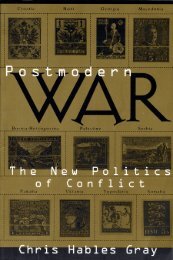6. Modern War - Chris Hables Gray
6. Modern War - Chris Hables Gray
6. Modern War - Chris Hables Gray
You also want an ePaper? Increase the reach of your titles
YUMPU automatically turns print PDFs into web optimized ePapers that Google loves.
<strong>Modern</strong> <strong>War</strong> [ 111 ]<br />
to military men and politicians alike. Railroads, the American system of<br />
manufacturing, steel production, and many other key facets of the modern<br />
economy have been directly traced to military demands (M. R. Smith,<br />
1985b). Recently, this relationship between economic strength and military<br />
power has become even clearer. Paul Kennedy s history of the modern<br />
empires, The Rise and Fall of the Great Powers (1987), shows that, at least in<br />
modern times, there has been a very direct relationship between the economic<br />
power of the dominant Western countries and their military power.<br />
While fluctuations occur, the two measures have never drifted very far from<br />
each other. Even nineteenth-century Prussia, that "army with a state," could<br />
only grow as powerful as its economy.<br />
In the Middle Ages, European war was dominated by aristocrats, although<br />
peasants did most of the dying. But in the 1500s three important<br />
trends developed that mark the beginning of modern war:<br />
1. Applying rationality to war instead of tradition<br />
2. The development of administrative bureaucracies<br />
3. The systematic application of science and technology<br />
A number of historians have called Niccolo Machiavelli the first<br />
theorist of modern war and for good reason. At a time when war in Italy was<br />
often an almost bloodless ritual, orchestrated by tradition and performed by<br />
professionals, he advocated conscripting armies to fight bloody, decisive<br />
battles. For most intellectuals of his time war was beneath serious theoretical<br />
or practical consideration, and it was deemed of only minor political importance.<br />
But Machiavelli argued that war was an intimate part of civil life. In<br />
his introduction to his book, The Art of <strong>War</strong> (1990), he links the two in a<br />
formula that hundreds of years later Clausewitz could well accept:<br />
Many are now of the opinion that no two things are more discordant and<br />
incongruous than a civil and military life. But if we consider the nature of<br />
government, we shall find a very strict and intimate relation betwixt these<br />
two conditions; and that they are not only compatible and consistent with<br />
each other, but necessarily connected and united together, (quoted in<br />
Gilbert, 1943, p. 3)<br />
While Machiavelli advocated conscription of free citizens with a stake<br />
in the war, it would be almost 300 years (1789) before such mass national<br />
armies would became dominant. Still, the expansion of the money economy<br />
in the sixteenth century led to the eclipse of the agricultural-feudal foundations<br />
of war in the Middle Ages. This opened the way for the city merchants<br />
and wealthy overlords to replace feudal military obligations with purchased<br />
professional soldiers, laying the foundations for permanent mass armies.<br />
Machiavelli was especially perceptive in noting the return of total war








